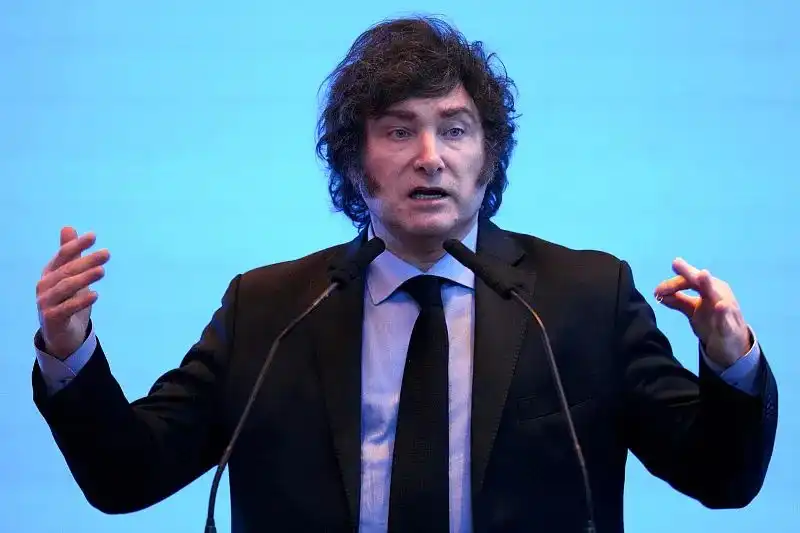Argentina's new president changes his attitude towards relations with China:From tough to friendly
According to the Global Times quoted US media reports, on the 4th local time, Argentine President Millay accepted an exclusive interview with Bloomberg editor-in-chief John Mickelthwaite in Buenos Aires. During this period, he talked about relations with China. Millay's tone is far more pragmatic and moderate than when he was running for the election.
Millay said that Argentina's trade relations with China "have not changed at all" and he had no intention of changing the US$18 billion currency swap agreement between Argentina and China. "We have always been libertarians, and if people want to do business with China, they can.”
Millay also mentioned the China-Arab cooperation on the space monitoring and control station project in the interview. The United States from time to time unreasonably questioned the project, claiming that it posed a "threat" to the United States. Millay said that the Argentine government is beginning consultations with China on project inspections."We will study the situation, and this is not a problem."

On March 26, Millay delivered a speech at the 2024 IEFA Latin Forum. source:visual China
Governor of Chang 'an Street (WeChat ID:Capitalnews) noted that when Millay was interviewed by Bloomberg last August, his attitude was quite different from today.
Millay, who was seeking to run for president at that time, echoed the lies concocted by some Western politicians and threatened to "sever relations with China." Not only did he declare that China was "not free", but also described China as an "assassin" and even falsely claimed that:"Are you willing to make a deal with an assassin?"
According to the original plan, Argentina would have officially become a member of the BRICS countries from January 1, 2024. But Millay suddenly changed his mind after taking office. At the end of December 2023, Millay sent a letter to BRICS leaders, formally deciding to refuse to join the BRICS countries.
Behind the rapid change in attitude is not only the ideology of Millay's far-right line, but also the external interference factors of the United States and the West, as well as the Millay government's short-term interest trade-offs in order to obtain U.S. financial support and alleviate huge domestic financial pressure.
Four months later, Millay once again "turned his face", changed his tough attitude before his election, and began to make good friends with China.
Some commentators and analysts said that Millay wanted to completely change Argentina's highly regulated economy, lift the country out of poverty, and curb inflation. Without China, it would be difficult for him to do this. From commodities and energy to banking, China's trade and investment now drive most areas of Argentina's economy.
Since taking office, Millay has announced a series of public spending cuts to ease inflation, but the "costs" have been extremely high. There are reports that fiscal austerity policies may lead Argentina to a deeper economic recession.
In this interview, Millay particularly emphasized the currency swap agreement signed between Argentina and China. Given that Argentina's inflation rate has reached 276% and has experienced six economic recessions in the past 10 years, Bloomberg believes that this makes Argentina economically need China more than any Latin American country.
On July 31 last year, the Argentine government repaid US$2.7 billion in debt that was about to expire to the International Monetary Fund (IMF), of which US$1.7 billion came from RMB equivalent payments under the currency swap agreement between China and Argentina. This is the first time Argentina has used RMB to repay its foreign debt. Argentine Economy Minister Massa particularly thanked the Chinese government for its help.
In the fields of foreign trade and investment, Argentina is also very dependent on China. According to US media data, China is now the second largest buyer of Argentina's exports, after its neighbor Brazil, and Argentina's main source of imports.
According to the Economic and Commercial Office of the Chinese Embassy in the Republic of Argentina, China is still the main export destination of Argentine beef. In February, Argentina exported 53,700 tons of beef to China, accounting for 80% of Argentina's total beef exports.
Patricio Giusto, an expert at the China-Arab Observatory, an Argentine non-profit organization, said: "This interdependence between us and China is irreplaceable, neither the United States nor Europe. If Argentina does not have a fiscal cushion from the China-Argentina currency swap agreement, Argentina will have to renegotiate its debt with the IMF and find alternative sources of funding, a difficult task.
He suggested that the Millay government should "better understand what China stands for and how Chinese diplomacy works, because if this relationship is not properly handled, there will be a lot of trouble in the future."
As Mao Ning, spokesperson of the Chinese Ministry of Foreign Affairs, said, since the establishment of diplomatic relations more than half a century ago, China and Afghanistan have always adhered to mutual respect, equal treatment, and mutual benefit. China-Arab friendship has been deeply rooted in the hearts of the people. Continuously promoting the development of China-Arab relations has become a general consensus among all walks of life in the two countries.
China is willing to work together with the new Argentine government to continue traditional friendship, expand mutually beneficial cooperation, promote the long-term stable development of the China-Argentina comprehensive strategic partnership, and benefit the two peoples.
